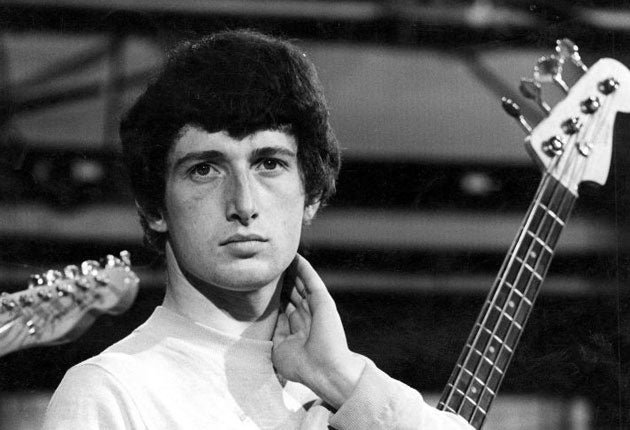Peter Quaife: Musician and artist who played bass guitar for the Kinks

On paper, Pete Quaife had an enviable job: he was touring the world playing bass in the Kinks, one of the biggest rock bands of the 1960s: it was always party time as alcohol and girls were readily available and he didn't have to worry about the group losing its popularity as its leader, Ray Davies, was a master songwriter. In reality, he was constantly caught in arguments and scuffles between the fractious Davies brothers, and quite often they would gang up and take it out on the rest of the group. With an unsettled management team, the Kinks was always on the verge of breaking up.
Pete Quaife was born in Tavistock, Devon, during wartime in 1943 but the family was based in north London. He attended the William Grimshaw secondary modern school in Haringey and befriended another student, Ray Davies. There is a telling photograph of Davies winning an athletics race with Quaife puffing along behind him. Both attended the Hornsey College of Art and after completing a short course Quaife worked for the men's magazine, The Outfitter.
In 1962, Quaife was playing a Futurama guitar and he joined Ray and Dave Davies in one of the UK's many burgeoning beat groups. The brothers were more proficient guitarists so Quaife was told to play bass. He agreed and in an amusing piece of rock trivia he bought a Rickenbacker bass from the same shop that sold one to John Entwistle of the Who, the shop assistant being Chris Squire, later the bass player with Yes. For a short while, the drummer was John Start, and they named themselves the Ravens after the Vincent Price film, The Raven. They played American rhythm and blues songs in north London youth clubs and at that time, Quaife was singing some lead vocals.
One night they accompanied an upper- class chancer, Robert Wace, who decided to manage them with his stockbroker friend, Grenville Collins. As they needed contacts in the business, they teamed up with Larry Page, a working class singer who had been known as "Larry Page, the Teenage Rave". John Start's parents wanted him to continue with his studies, so the band advertised in Melody Maker for a drummer. At Mick Avory's audition, the three musicians camped it up, pretending they were a gay group, but Avory still joined them. As "kinky" was a buzz word with sexual overtones, they became the Kinks.
The Kinks were rejected by Decca and Philips but they were taken up by an independent producer, Shel Talmy, an American based in the UK. The results were released by Pye Records. Early in 1964, the first single, a revival of Little Richard's "Long Tall Sally", counted for little, but later in the year, Ray Davies' song, "You Really Got Me", went to No 1. It had a classic rock riff to rival "La Bamba", "Bo Diddley" and "Louie, Louie", and the Kinks followed it with another of his songs, "All Day And All Of The Night", which was almost as successful. Their first album, Kinks, was bursting with energy. After two wild singles, Ray Davies wrote the gentler "Tired Of Waiting For You", which had a sturdy bass line from Pete Quaife and was another No 1.
With his anorak and Vespa scooter, Quaife was happy with the group's mod image. His wide interests came through in interviews. He liked rock climbing and his musical tastes included Barbra Streisand and the Modern Jazz Quartet.
The Kinks had further hits in 1965 with Ray Davies' songs, "Everybody's Gonna Be Happy" (a tribute to Tamla-Motown), "Set Me Free" (a public message to the Kinks' management), "See My Friend" (a touching, Indian-influenced song about the loss of friendship) and "Till The End Of The Day" (a return to the prototype heavy metal of "You Really Got Me").
In June 1966, Quaife and the Kinks' road manager were involved in a crash in Warrington. Quaife broke his right foot and John Dalton from the Mark Four substituted for six weeks. He rejoined with some reservations. After a disastrous US tour for which Page was blamed, the management were suing each other and the Kinks' assets were frozen until 1968.
With songs like "A Well Respected Man", Ray Davies mocked the people he saw in London. He turned his attention to the idle rich in "Sunny Afternoon" (1966), their third No 1. Quaife found Davies overpowering when he told him what to play, but he agreed that Davies' idea for the descending bass in "Sunny Afternoon" couldn't be bettered. He found "Dedicated Follower Of Fashion" "an incredibly boring song to play, and I had to play it night after night."
The Kinks continued their social commentary with "Dead End Street" (the bleakness of being unemployed, with both Dave and Pete playing bass guitars), "Waterloo Sunset" and "Autumn Almanac". As well as these singles there was The Village Green Preservation Society, a neglected album from 1968. Quaife felt that this album was too quirky to sell and he left the band in April 1969. This time John Dalton stepped in as his permanent replacement.
Quaife formed a country/rock band with two Canadians and another Englishman, hence the name, Mapleoak. Their single, "Son Of A Gun", failed to chart. Quaife married a Danish girl, Beden, and settled in Denmark. In 1980, he moved to Belleville, Ontario and worked as a cartoonist and artist. He joined the Kinks on stage in Toronto in 1981 and again when the group was inducted in The Rock And Roll Hall Of Fame in 1990. His renal problems led to a book of cartoons, The Lighter Side Of Dialysis, in 2004.
Peter Alexander Greenlaw Quaife, musician: born Tavistock, Devon 31 December 1943; married (divorced; one daughter); died 23 June 2010.
Join our commenting forum
Join thought-provoking conversations, follow other Independent readers and see their replies
Comments
Bookmark popover
Removed from bookmarks